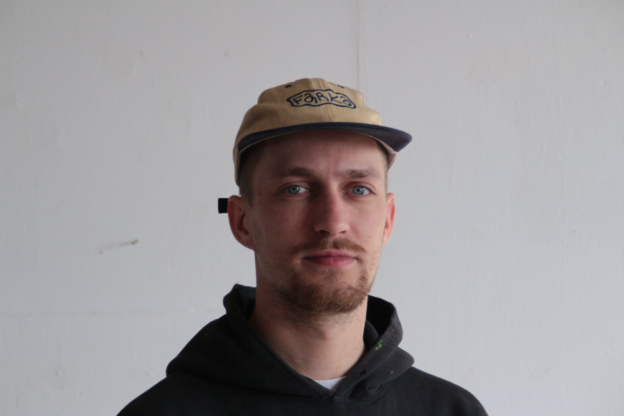Hanging out at a gallery show, Bram Engelaar is looking for a piece he’s interested in. Once he finds one, he gets closer. In fact, maybe he’s too close. Only 3 centimeters away, he has to remove his cap. Then, he starts inspecting the piece meticulously, looking for small details, something not everyone can see. Bram is constantly trying to understand how things work, how it’s done and looks at art the same way a scientist uses his microscope. That’s why he loves and makes photography, and especially analog photography.
“I love what the camera can bring as a technique, that the human eyes cannot do, like the shallow depth of field for example”.
When Bram was in Leipzig six years ago, he visited the Museum fûr Druckkunst (printing museum) and he really enjoyed it. Since this moment, Bram has been deeply interested in and attached to the process of making things. This is what impresses him most, and you can see it in his art. He uses a technical camera that works like at vintage early 1900s camera, which allows him to focus on the shape of the model, and not how they look because the image he sees in the matte glas is upside down.
photos by PILOTENKUECHE or supplied by artist
Bram makes art the same way he looks at it, meaning observation. Most of his work is about human models, and about something imperfect he observes. He’s more attracted by individuality of people and doesn’t really make hierarchy between his models. He’s a very instinctive artist. He doesn’t seem to ask himself a lot of questions before starting to make. Because he didn’t go to art school, Bram has a very original way of seeing art, and how to make it. Of course, he still has knowledge about art history, he told me he was inspired by Rembrant’s etchings for his portraits, for example.
A way of life
Bram studied communication and multimedia design. He didn’t really like it because it was a very commercial way of seeing, but he acknowledges he leant a lot about different techniques. During his last year of study, he was a little bit lost in his life and work, but he met the man who became his mentor, Milan Gies. Bram said Milan really understood him, and pushed him hard to keep going with photography. So he decided to give it a chance.
A few years later, he’s here, at PILOTENKUECHE. Exploring more disciplines is the next step for him, because photography is starting to bore him. He seems to be really what we’d call a jack of all trades. Even with photography, he explored all kind of techniques to show and to make pictures, such as bitmap, printing technique, and more.
Bram and materiality
After struggling a lot in the beginning, Bram seems to have found his way of working. Because materials are important to him, he just started gathering stuff he found in the studio or in the street, and tried to make composition with them like a chemist. Again, his art works with experimentation and processes, in an empiric way. He’s very open to the conversation with the others artists on the residency, and he’s really glad to be surrounded by different people and opinions.
Written by Jonas Lamoliatte
Order Connection Order
Vernissage: Sat 17 Feb 7-10 PM
Open: Sun 18, Fri 23 – Sun 25 4-8PM
Alte Handelsschule
Giesserstr 75
04229 Leipzig
Barbed-wire Ghost
Vernissage: 16 March 7-10 PM
Open: Sun 17 – Wed 20 March 4-8 PM
PILOTENKUECHE
Franz-Flemming-Str 9
04179 Leipzig





















